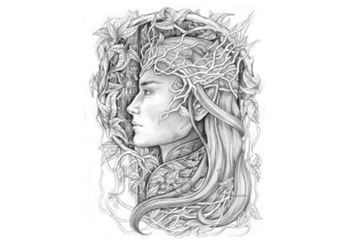
An elf (plural: elves) is a type of humanlike supernatural being in Germanic mythology and folklore. In medieval Germanic-speaking cultures, elves seem generally to have been thought of as beings with magical powers and supernatural beauty, ambivalent towards everyday people and capable of either helping or hindering them.
However, the details of these beliefs have varied considerably over time and space, and have flourished in both pre-Christian and Christian cultures. The word elf is found throughout the Germanic languages and seems originally to have meant ‘white being’. Reconstructing the early concept of an elf depends largely on texts, written by Christians, in Old and Middle English, medieval German, and Old Norse. These associate elves variously with the gods of Norse mythology, with causing illness, with magic, and with beauty and seduction.
After the medieval period, the word elf tended to become less common throughout the Germanic languages, losing out to alternative native terms like Zwerg (“dwarf”) in German and huldra (“hidden being”) in Scandinavian languages, and to loan-words like fairy (borrowed from French into most of the Germanic languages). Still, beliefs in elves persisted in the early modern period, particularly in Scotland and Scandinavia, where elves were thought of as magically powerful people living, usually invisibly, alongside everyday human communities.
Read more